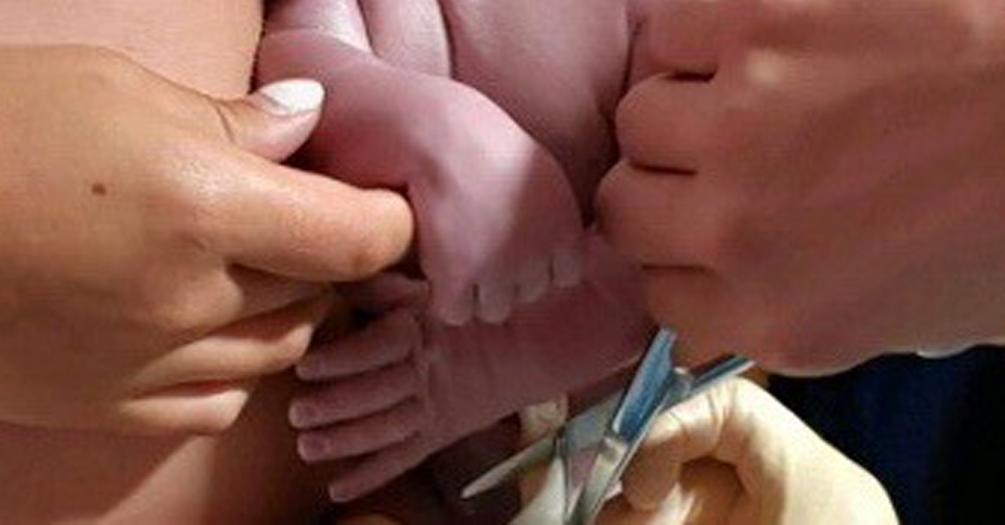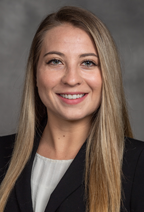Shifting perspectives: A personal story of maternal health and outcomes

Jessie Nelson
Medical student at the University of Michigan Medical School, and master’s student in clinical research
The Experience
It was a late Sunday night as I stepped into the all-familiar Michigan Medicine hospital. This time, however, my perspective was more than a little bit different. I had wandered these halls just weeks prior—not as a patient, but as a medical student. And not just any medical student either, but a maternal-fetal medicine sub-intern with aspirations of becoming an OB-GYN myself. Now, I entered as an expectant mother, ready to experience the blessings of labor and delivery. Little did I know that the experience would be both the most amazing and frightening moment of my life.
I got situated in my spacious room, admiring the beautiful window view of the arboretum. I was greeted by friendly nurses, midwives, and physicians. Surrounded by monitors, attentive staff, and an arsenal of technology and medical resources, I felt safe and secure. As night fell into day, I was getting closer and closer to meeting my little boy. Soon, night fell again and ... it was time.
Fueled by adrenaline and excitement, I harnessed all of my physical and mental strength. Time slowed and I was completely focused. I felt no pain, the voices and beeping monitors became muffled background noise, and then ...it happened. Tears of joy and intense love engulfed me as I pulled my sweet baby onto my chest. His eyes had opened immediately. I stared into those soft, innocent blue eyes and my heart melted. Nothing could ever come between us – mother and child. Or so I thought.
Soon, the muffled background noises became more audible voices. The voices adopted a concerned tone. “No need to panic,” the attending physician muttered, “you’re just bleeding more than we expected”. Her calm words were reassuring, and my tension fled as they gave me medication to help resolve the issue. But moments later, I began to feel funny. It is hard to put words to it, but it was almost like a floating sensation. Then, I heard those words that instill fear in even the most seasoned medical professionals: “She’s hemorrhaging”.
I heard it before as a medical student, but this was different. I was hearing it as the patient. My stomach dropped, and I looked deep into the eyes of my beautiful baby. I felt like my heart was being crushed. Over and over in my head, I was thinking, please don’t take me from my baby. Please don’t let this child grow up without a mother. Please help. Please... no... please.
My peaceful, arboretum-view room became filled with people. I couldn’t keep track of who was who. The nurse pumped medications through my IV. Someone else stuck my thigh with a needle. Others were pressing on my abdomen. I continued to hold my baby, not wanting to let go. At that moment, an extreme sorrow washed across my body as I remembered the patients I had on my maternal-fetal medicine sub-internship—all those women who had the same devastating thoughts of being taken from their baby as their life was in jeopardy. What had ….?
Medication after medication, treatment after treatment, and finally the room calmed. The warm, female physician took my hand, looked me in the eyes, and said, “you’re going to be okay”. My eyes welled with tears.
Then it was my turn. I looked into my baby’s eyes and whispered, “we are going to be okay”. In that moment, I had never been so appreciative of life. I felt extremely fortunate to have received the care and resources that I did, but I also couldn’t stop thinking about the women who didn’t have the same favorable outcome that I did.
The Reflection
Being on a high-risk obstetrics medical school rotation just before, I saw too many
devastating cases. Maternal mortality continues to be a public health problem, with
postpartum hemorrhage being the leading cause.
My heart was further shattered when I thought about who was most likely to die during childbirth. Black women are more likely than their white counterparts to die when giving birth. It didn’t make sense to me on my rotation that a woman’s risk of being stripped from her baby was increased on the basis of her skin color alone. But it makes a little bit more sense now. The truth is, the disparity isn’t based on skin color alone. As we learn in public health, skin color–a phenotypic marker of race–is not inherently more likely to lead to poor health outcomes. But skin color is an incredible proxy for racism. Women are not more likely to die in childbirth because of their race, they are more likely to die because of institutional racism that puts them at a disadvantage.
Those women looked into their baby’s eyes just as I did. Those women felt fear just as I did. Those women had such intense love for their children and deserved to be with them. Yet, the racial disparity exists, and it rips at my heart. I felt a newfound sense of motivation to actively close this disparity gap, especially as someone going into the medical field.
A couple days after the birth of my child, just prior to discharge, I took a moment to look around my room and reflect. Far too many women don’t have access to this technology, resources, comfort items, or skilled personnel that I did. I couldn’t imagine going through this without these resources, but unfortunately, that is the reality for many women around the world. Between racial inequity and socioeconomic disparity, there is so much that still needs to be done to assure that safe childbirth is available to everyone. The biggest stake to the heart is that the majority of these deaths are completely preventable.
I wrapped my baby up in my arms, and just before walking out of the room, I paused to take a breath, looked back, and then left with an unwavering motivation to instill change.
About the author
 Jessie Nelson is currently completing her Master of Science in Clinical Research (MSCR)
degree through the Department of Epidemiology at the University of Michigan School
of Public Health (GY 2023). As a dual degree student, she is also pursuing her MD
through the University of Michigan Medical School (GY 2024). In addition to completing
her academic courses, Nelson also works as a graduate student instructor for an undergraduate
Physiology course, conducts clinical research in the departments of OB/Gyn and Dermatology
at Michigan Medicine, and is a co-founder of the medical school's Parents in Medical
School (PiMS) student organization. At home, she enjoys spending time with her husband,
her 7-year-old stepson, and her 5-month-old son.
Jessie Nelson is currently completing her Master of Science in Clinical Research (MSCR)
degree through the Department of Epidemiology at the University of Michigan School
of Public Health (GY 2023). As a dual degree student, she is also pursuing her MD
through the University of Michigan Medical School (GY 2024). In addition to completing
her academic courses, Nelson also works as a graduate student instructor for an undergraduate
Physiology course, conducts clinical research in the departments of OB/Gyn and Dermatology
at Michigan Medicine, and is a co-founder of the medical school's Parents in Medical
School (PiMS) student organization. At home, she enjoys spending time with her husband,
her 7-year-old stepson, and her 5-month-old son.
- Read more about childhood health on the Pursuit
- Read more from the Power of Public Health Storytelling series
